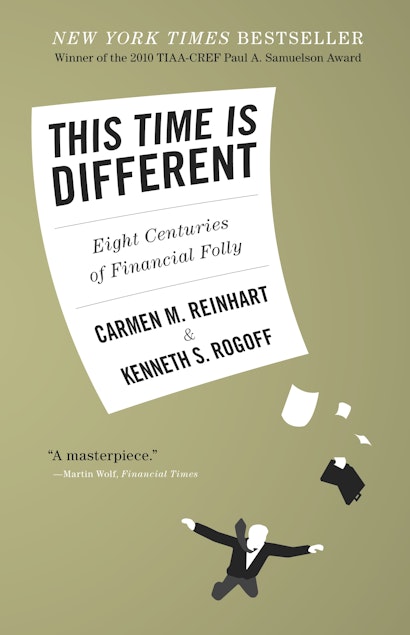"[A] masterpiece."—Martin Wolf, Financial Times
"Essential reading . . . both for its originality and for the sobering patterns of financial behaviour it reveals."—The Economist
"Perhaps the finest study of financial crises ever published."—Ezra Klein, Washington Post
"This Time Is Different doesn't simply explain what went wrong in our most recent crisis. This book also provides a roadmap of how things are likely to pan out in the years to come."—Edward Chancellor, Wall Street Journal
"Everyone working on economic policy should own This Time Is Different and open it for a bracing blast of sobriety when things seem to be going well."—Greg Ip, Washington Post
"The most comprehensive study of financial crises and their aftermath."—Eduardo Porter, New York Times
"The pre-eminent history of financial crises."—Adam Davidson, New York Times Magazine
"Compelling. . . . The essence of [This Time Is Different] is that while financial crises come in different varieties, they are not mysteriously born of undersea earthquakes, but frequently occurring events that can be spotted and even controlled if politicians and regulators know what to look for."—Devin Leonard, New York Times
"[A] terrific book."—Andrew Ross Sorkin, New York Times
"This is the kind of economics we desperately need, as it is relevant, fact-based and replete with wisdom from the past—and lessons for the future."—Irish Times
"This Time is Different takes a Sergeant Friday, just-the-facts-ma'am approach: before we start theorizing, let's take a hard look at what history tells us. One side benefit of this approach is that the current book manages to be both extremely useful to professional economists and accessible to the intelligent lay reader. The Reinhart-Rogoff approach has already paid off handsomely in making sense of current events."—Robin Wells and Paul Krugman, New York Review of Books
"Among policy experts and economists, This Time Is Different . . . has become so influential that when somebody says, 'We live in a Reinhart-Rogoff world,' everybody else in the room nods sagely."—Justin Lahart, Wall Street Journal
"[Rogoff and Reinhart] know more about the history of financial crises than anyone alive. . . . In an era when most 'analysts' rely on maybe 30 or 40 years' worth of financial history—and then only that of the U.S.—the authors' knowledge of financial crises and government bond defaults going back to the Spanish empire and before offers a richer perspective."—Brett Arends, Wall Street Journal
"The definitive book on financial crises."—Steven Pearlstein, Washington Post
"Two top-notch economists provide a clear and interesting explanation of why economic crises keep occurring."—David Schwartz, Financial Times
"Here's a deep and rewarding assignment for all of you, young and old, poor and rich, bullish and bearish. Retire to a quiet spot with a copy of This Time Is Different."—Bob Lenzner, Forbes.com
"[A] fine new history of financial debacles."—Daniel Gross, Newsweek
"Seminal."—Rana Faroohar and Bill Saporito, Time
"Wouldn't it be nice to have $1,000 for every time a pundit proclaims an era of endless prosperity, consigning booms and busts to the dumpster of history? The next time you hear that canard (and you will) pour yourself a single malt and dip into Carmen M. Reinhart and Kenneth S. Rogoff's landmark study, This Time Is Different. Wherever you open the book, you'll find proof that debt-fueled expansions have ended in financial ruin for hundreds of years. . . . The result is a visual history laid out in beguilingly simple graphs and tables, making the book both definitive—a must read for professors and investors—and accessible to a wider audience."—James Pressley, Bloomberg News
"Financial folly, economists Carmen Reinhart and Kenneth Rogoff show in this groundbreaking book, knows no boundaries and has no expiration date. . . . For a book built around numbers, This Time Is Different makes for surprisingly good reading. The authors are well aware that human nature is at the heart of the disasters they document, and they enliven the text with brief and amusing accounts of charlatans and cheats."—Paul Wiseman, USA Today
"[A] landmark work."—Megan McArdle, The Atlantic
"A tour de force of quantitative analysis covering financial crises affecting 66 countries over the past 800 years, the book identifies pre-crisis patterns that recur with eerie consistency. This Time Is Different is a must-read for anyone on the lookout for canaries in coal mines."—Barron's
"Readable, shocking, and vital, this is a book that every investor who has been tempted by a hefty interest rate in a faraway land should study."—Andrew Allentuck, National Post
"Reinhart and Rogoff give us a data-driven study that is global in sweep but also a model of clarity. The authors package their notably nonhysterical analysis of the latest crisis in a large, self-contained section of the book inviting harried readers to skip right ahead to it."—Daniel Akst, CNNMoney.com
"Superb."—Neil Reynolds, Globe & Mail
"This book's distinctive strength is that it's built around a massive international database going back as far as twelfth-century China and medieval Europe."—Harvard Business Review
"A powerful and eloquent statement. . . . Reinhart and Rogoff have done an extraordinary job in putting together statistics on government debt—a task that economic historians should have done long ago but shied away from because of the difficulties of defining 'government,' which is often complex and multi-layered."—Harold James, American Interest
"Awesome."—William Easterly, AidWatch
"[A] modern classic. . . . In their landmark study of hundreds of financial crises in 66 countries over 800 years, Reinhart and Rogoff find oft-repeated patterns that ought to alert economists when trouble is on the way. One thing stops them waking up in time: their perpetual belief that 'this time is different.'"—Ross Gittins, Sydney Morning Herald
"[A] valuable new book."—Idaho Statesman
"Having studied mountains of economic data during the past eight centuries, the authors insightfully point out the highly repetitive nature of financial crises resulted from a dangerous mix of hubris, euphoria and amnesia."—Shanghai Daily
"[This Time Is Different] is an unusually powerful bull detector designed to protect investors and taxpayers alike—eventually, at least, and provided the spirit is willing. . . . The book's most memorable passages—what the authors call its 'core life'—are to be found not in colorful stories about long-ago personalities, but rather in its various tables and figures. They take some time to comprehend, but any responsible citizen can and ought to consider the evidence they present. It is overwhelming."—David Warsh, Harvard Magazine
"A vital source of reference in debates on the causes and consequences of financial crises."—Andrew Gamble, New Statesman
"For those who want to relearn the forgotten lessons of the past, This Time Is Different, by economics professors Carmen Reinhart and Kenneth Rogoff, is an excellent place to start. . . . These are lessons worth learning."—Liaquat Ahamed, National Interest
"Reinhart and Rogoff present a sobering reminder that financial crises are a serial phenomenon—caused in no small part by the seductive 'this-time-is-different syndrome,' the prevalent belief that to us, here and now, old economic laws of motion no longer apply. Their ambitious quantitative history of financial crises draws out sweeping parallels between financial crises, across times and continents; and between inflating away domestic debt, currency debasements, and defaults on external debt."—Finance & Development
"[An] instant classic."—Alen Mattich, Dow Jones Newswires
"One book in particular has been circulating among economists and market insiders. This Time Is Different analyzes vast amounts of historical data on financial debacles, including state failures around the world, bank crises, currency woes and high inflation. The title satirizes those who fail to learn from past blunders and repeat them while insisting, 'This time is different.'"—Hideo Tsuchiya, Nikkei Weekly
"Reinhart and Rogoff have produced a splendid book detailing the massive self-destructive behavior that all states have been undergoing over the past several centuries. . . . Reading this excellent book on the paths of previous economic cycles could help avoid some of the worst results of our self-destructive financial acts."—Lloyd Demause, Journal of Psychohistory
"An eye-opening look at the cycles of boom and bust and how governments deal with those cycles."—Arkansas Business
"A magisterial work on the causes and consequences of crises stretching back 800 years."—Matthew Valencia, Economist.com
"Reinhart and Rogoff have compiled an encyclopedic analysis of the history of financial crises over the last 750 years. But their volume is not merely of historical interest. Rather, it has great relevance for anyone interested in understanding how the current financial crisis is likely to unfold."—Choice
"I couldn't put it down."—Richard Sylla, EH.Net
"Easily the most useful, and arguably the best, is this splendid piece of research and analysis on, as the subtitle says, 800 years' worth of booms and busts."—Bill Emmott, Survival
"This Time Is Different changes the way we can study financial crises. It is the start of a truly comprehensive approach to the subject. . . . It adds new ideas that will be useful for gauging the risk of future crises and perhaps even reducing their impact, if investors and policymakers are willing to learn from other people's mistakes, not just their own."—Kurt Schuler, CATO Journal
"The book will be essential reading for anyone who wants to put the recent crisis into some historical perspective—and get some ideas on how to prevent, or at least delay, the next one."—David Orrell, Foresight
"It's the only book I have seen that provides, with great detail and over 800 years, clearly defined, analytical, data-driven evidence of what the impact of a post-financial crisis period is and hence what we can anticipate. . . . I've never seen anything that comes close in terms of being comprehensive. It's a tour de force."—Dambisa Moyo, The Browser
"The book by Reinhart and Rogoff is one for the ages, and it will be remembered as a landmark event, not least given the coincidence of its publication of such a deep and broad historical analysis of economic crises with the very moment when the world was entering a massive 'hundred year flood' type of calamity. The authors' empirical work is encyclopedic and much of the data are highly original and the result of intense effort. The necessary theoretical framing is provided, but in terms that all target readers should be able to absorb. The overall view is panoramic and the message carried is an important one for all to hear—policymakers, commentators, and researchers. Crises are still with us, they are very painful indeed, and perhaps it will always be so. It is up to us to figure out why and how crises happen, and to figure out what, if anything, can and should be done to mitigate their devastating effects in future. This book is therefore, above all, a call to action."—Journal of Economic Literature
"Carmen Reinhart and Kenneth Rogoff take a much-needed longer view, placing the current crisis, with a focus on the U.S. housing bubble, into historical perspective."—Anil Hira, Perspectives on Politics
"Reinhart and Rogoff's book belongs to the tradition of studies that appear in the middle of a crisis but it manages to keep its spine above water because of its historical depth and systematic rigour."—Sakis Gekas, Dublin Review of Books
"[T]he pre-eminent history of financial crises."—Adam Davidson, New York Times Magazine
"The book by Reinhart and Rogoff is one for the ages, and it will be remembered as a landmark event, not least given the coincidence of its publication of such a deep and broad historical analysis of economic crises with the very moment when the world was entering a massive 'hundred year flood' type of calamity. The authors' empirical work is encyclopedic and much of the data are highly original and the result of intense effort. The necessary theoretical framing is provided, but in terms that all target readers should be able to absorb. The overall view is panoramic and the message carried is an important one for all to hear—policymakers, commentators, and researchers. Crises are still with us, they are very painful indeed, and perhaps it will always be so. It is up to us to figure out why and how crises happen, and to figure out what, if anything, can and should be done to mitigate their devastating effects in future. This book is therefore, above all, a call to action."—Journal of Economic Literature
"[E]conomists Carmen Reinhart and Kenneth Rogoff take a much-needed longer view, placing the current crisis, with a focus on the U.S. housing bubble, into historical perspective."—Anil Hira, Perspectives on Politics
"The most important authorities probably in the world now on financial crashes are Kenneth Rogoff and Carmen Reinhart."—Bill Clinton
"An extraordinary piece of work."—Ben Bernanke, Nobel Prize–winning economist and former chair of the U.S. Federal Reserve
"A classic."—Nouriel Roubini
"This Time is Different is terrific, for it gives just the perspective we need on the current world economic crisis. People can't expect to understand the current crisis without some in-depth look at past crises. That is exactly what this excellent and timely book provides."—Robert J. Shiller, Nobel Prize–winning economist and bestselling author of Irrational Exuberance
"This Time Is Different is a tremendously exciting, topical, and controversial book on the history of debt and default. This one belongs on everyone's shelf."—Barry Eichengreen, author of The European Economy since 1945
"This is quite simply the best empirical investigation of financial crises ever published. Covering hundreds of years and bringing together a dizzying array of data, Reinhart and Rogoff have made a truly heroic contribution to financial history. This single marvelous volume is worth a thousand mathematical models."—Niall Ferguson, author of The Ascent of Money: A Financial History of the World
"You will be hard-pressed to find a more comprehensive and insightful analysis of financial crises. Reinhart and Rogoff's superb book is a must-read for anyone looking to understand past and present crises, as well as navigate those of tomorrow."—Mohamed El-Erian, author of When Markets Collide



